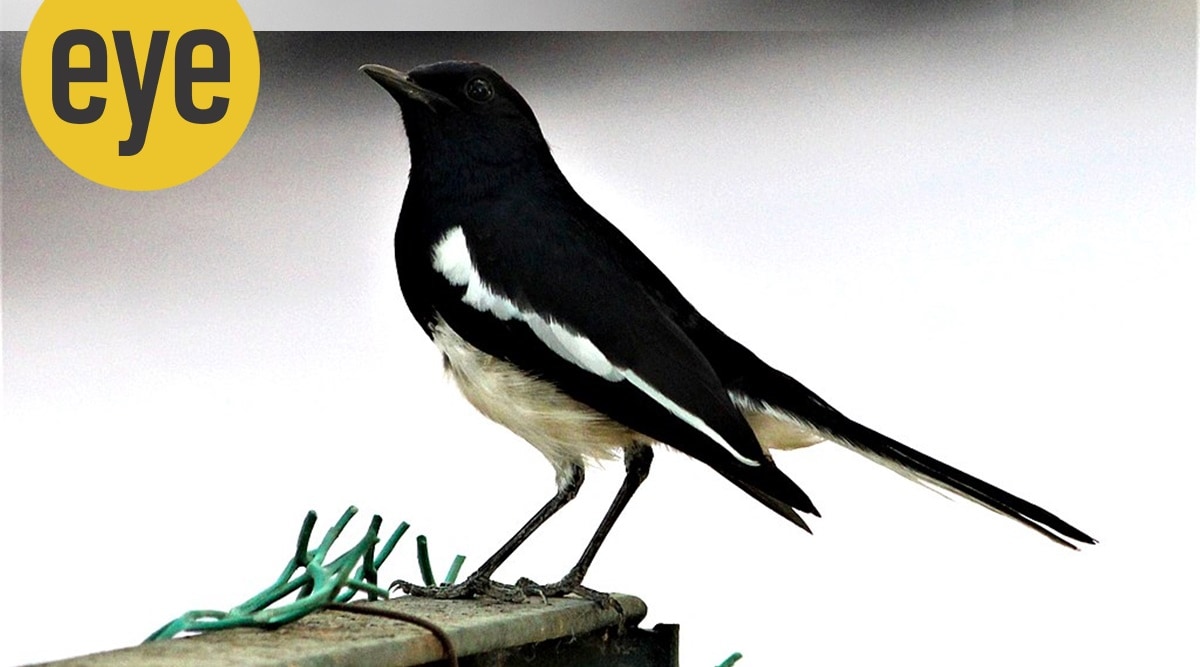The mystery of the musical magpie robin
He is in search of love and he seems to be singing from everywhere all at once. Where could this elusive bird be?
 Oriental magpie robin (Source: Wikimedia Commons)
Oriental magpie robin (Source: Wikimedia Commons) Many summers ago, in Goa, I woke up very early one morning to a lovely flute recital by a tuxedo-ed magpie robin. Of course, I grumbled – I was on holiday, but hey, this was a maestro at work, so I kept shut and listened. I soon discovered that he had more than one composition in his repertoire and would change the venue of his recital from time to time: from one building to the next, to the trees at the back of the garden and so on. Yes, I knew that most gentlemen birds sang to declare to other gentlemen that they were alive and well and that they had better stay away from this area if they knew what was good for them. They also sang their hearts out to woo a fair lady, which our gentlemen in question had successfully done. I saw the happy pair grub around for insects and worms in the garden later in the morning. But why the multiple compositions? In a book on birdsong the reason became clear. Some gentlemen birds apparently sang different numbers from the same general area pretending to be more than one gentleman, trying to claim a property perhaps larger than what he really needed (like so many people we know). Any other gentleman would think, “Hey, I can challenge and fight perhaps one guy, but not two or three!” And so, stay away.
I visited Goa several times after that but never in summer. Oh yes, there was always a magpie robin pair in attendance in the garden. For instance, this February when I was there, the gentleman was practising his scales, so to speak. So, I didn’t really know whether what I had heard that first summer was actually a magpie robin trying to pull a fast one on his rivals by singing different compositions from different perches within the same property, which included a lovely garden full of flowering bushes and trees, a pool and three low-rise buildings – something any lady would have approved of!
This summer, I was back in Goa and determined to see if history repeated itself. Of course, there was always the question if the magpie robin in attendance now was the same one that I had encountered all those summers ago or just an heir or usurper. They can live for up to 15 years, so it was possible that this indeed was the same maestro. If this fellow did the same thing, I knew that what I had suspected was probably right. Scientists always insist that an experiment be repeated in order to be sure. So, I thought I would do this more systematically — I would time every song, note its location and then draw conclusions.
On the first morning, the maestro began his recital at 4.33 am and the number lasted till 4.57 am. He took a five-minute timeout and resumed from a slightly different location, a longer session with a more elaborate composition that lasted 22 minutes. Another five-minute timeout followed and then he again changed his area and belted out another number for 11 minutes. At 5.51 am, he went even further away. Then, after 5.55 am, his positions changed even more quickly and the compositions became briefer.
On the second morning, much the same pattern followed. The durations of his songs averaged about 10 minutes, with variations every time and breaks that lasted 10 minutes or so. On some of the breaks, I think he visited some additional properties next door which he had probably laid claim to. He would vanish, silence would descend and then 10 minutes later he would be back, singing away.
But then I realised how vague this still was. On some mornings he would sing virtually non-stop till pretty late and again in the afternoons and evenings, especially from what seemed to be his favourite stage: on top of the water tank on the terrace of the adjoining building. Worryingly, this summer he has no girl by his side! Had they quarrelled? Had she got bored with his recitals and found a more talented maestro? Or worse, had she been taken by a shikra? That would be dreadful. Or, was she sitting on her eggs? I watch the gentleman desultorily pick up insects and worms in the garden, but he gives nothing away.
With so many variables at play, I sometimes wonder how scientists formulate their theories around animal (and our) behaviour. They are as rigorous (and objective) as they can be when they conduct experiments, but there is so much we still do not know. It would be interesting (even if horribly voyeuristic) to fit a tiny camera to the bird and record its whereabouts – and I’m pretty sure this is being done, if not with the magpie robin then with other species which are in more danger of extinction. Of course, this would be a wholesale invasion of privacy but only in the interests of science and conservation.
At the moment, I’ve decided just to sit back and enjoy his music. And of course, I’m hoping that by the time I leave, he will be busy shopping for worms with a sweet lady by his side. Then they can get on with the job of raising the next generation of musicians that will entertain me in the summers that lie ahead.
- 01
- 02
- 03
- 04
- 05































